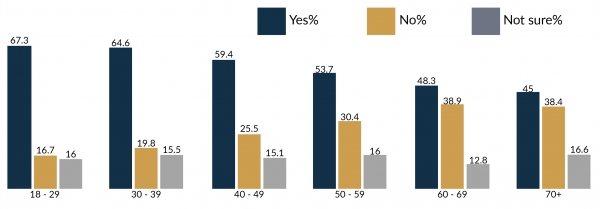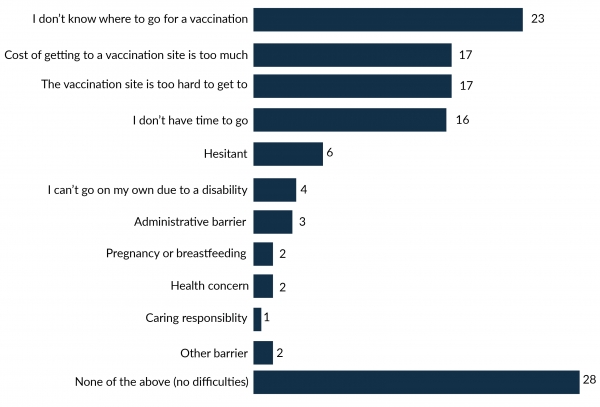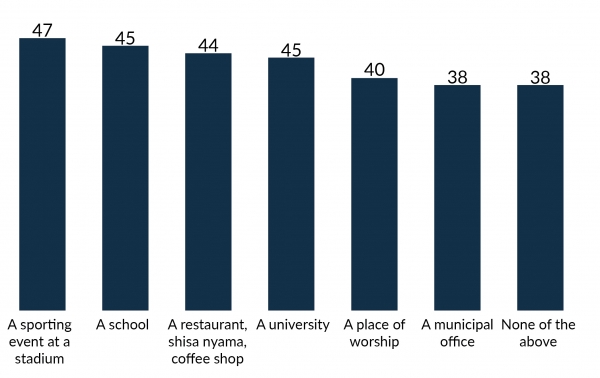Vaccine perceptions among South Africans: How do we get more people vaccinated?
DATE: 14 April 2022
In February 2021, South Africa rolled out its national COVID-19 vaccination programme as an initiative to curb the pandemic. As the roll-out progressed, the vaccine was made widely available and cost-free to all South Africans, with the expectation that the uptake would be high. Since then, however, a vaccine democracy survey conducted by a consortium from the University of Johannesburg and the Human Sciences Research Council (UJ/HSRC) and its partners has revealed concerning trends and patterns of low vaccine uptake among South Africans.
The survey results released in December 2021 showed that, over the last three of the five rounds of the survey (December 2020 – November 2021), vaccine acceptance rates had grown exponentially. These results were consistent with those from an earlier survey conducted by the HSRC and partners between June and September 2021 – the “One Year Later” survey. The results of the latter showed that just under two thirds (63%) of participants had reported an intention to take the vaccine.
Figure 1: Vaccination status and views about vaccination (%)
Despite these acceptance rates, the HSRC’s Prof Narnia Bohler-Muller said that only 42% of the adult population had been vaccinated at the time.
What then accounted for the gap between the number of South Africans who felt favourably towards the vaccine and those who had actually been vaccinated? And why, despite a gradual increase in vaccine acceptance, were more than a third of South Africans still hesitant?
Barriers to vaccination
The UJ/HSRC COVID-19 Democracy Survey found that the main barrier to vaccination was concern about perceived short- and longer-term side effects. Concerns about side effects were reported across all age-groups in the adult population (Figure 2).
Figure 2: Concerns about side effects by age-group (%)
One common fear, according to Dr (Prof) Ramneek Ahluwalia from Higher Health, is the perceived effect on reproductivity and the menstrual cycle. Evidence shows that vaccination does have an impact the menstrual cycle, but the effect is small and temporary – researchers found that each dose was associated with a one-day increase in the current cycle length, on average. Acknowledging side effects and providing accurate information about their magnitude is important for retaining the credibility of public health messaging. Ahluwalia said that many other concerns were not based on scientific evidence but the result of infodemics and misinformation that emanated mostly from social media.
Among vaccine-accepting adults (those who indicated that they would probably or definitely get the vaccine), structural barriers to vaccination uptake were also common. These included not knowing where to get vaccinated, difficulty accessing a vaccination site, cost-related barriers and time constraints. (Figure 3).
Figure 3: Barriers to vaccination among vaccine-accepting adults
- Multiple response questions asked respondents whether any of six pre-recorded barriers prevented them from getting the COVID-19 vaccine.
- Open-ended ‘other barriers’ responses were also coded and integrated.
- Four reasons predominated among vaccine-favourable adults: not knowing where to get vaccinated (23%), difficulty accessing a vaccination site (17%), cost-related barriers (17%), and time constraints (16%).
- Less-mentioned challenges (6% or less) included general hesitancy, disability, administrative factors, health concerns, pregnancy and caregiving responsibilities.
- 28% mentioned no difficulties in accessing vaccination.
Working towards increased vaccine uptake
Vaccine mandates: In 2022, discussions around mandatory vaccination, especially in the workplace, emerged. Vaccine mandates are considered a possible intervention to increase vaccine uptake.
According to the HSRC’s Professor Sibusiso Sifunda, 25.9% of employed participants in the “One Year Later” survey reported that their employers required them to have a COVID-19 vaccine to return to work. Data from the UJ/HSRC survey showed that just over half (51%) of the population supported vaccine mandates, and 17% of respondents indicated that they were neutral rather than opposed to the measures. However, when asked about whether they would support having to produce a vaccine passport for specific public places – such as sports stadiums, schools or places of worship – support dropped to just under 50%. (Figure 4).
Figure 4: Public support for vaccine mandates (%)
Education and awareness campaigns: These are seen as a vital tool for speaking to people’s concerns and facilitating vaccine uptake. According to Ahluwalia, that Higher Health has implemented a system of peer education and vaccine mobilisation, to which he attributes the relatively high vaccine rate (60%) among students in higher education institutions. He emphasised the importance of face-to-face engagements in which “science is put in a simple language”.
Taking Vaccines to the people: Given the findings on the accessibility of vaccine sites, Bohler-Muller proposed mobile sites and pop-up sites as a way of taking vaccines to the people, particularly in rural areas. While addressing structural barriers is important, implementing vaccine mandates could play an important role in raising the vaccination rate in South Africa, she said.
The UJ/HSRC Covid-19 democracy study was jointly run by the University of Johannesburg’s Centre for Social Change, and the HSRC’s Developmental, Ethical and Capable State research division. In the fifth round, a total of 6633 participants participated between 22 October and 17 November 2021. Data were weighted by education, age and race, to ensure they reflect the make-up of the national population. In addition, the team incorporated an adjustment for vaccination rate by gender provided by the Department of Health to match data for the midpoint of the survey period.
The “One Year Later” survey was conducted by the HSRC to explore South Africans’ experiences of COVID-19 and perceptions of the national vaccination programme. It also asked participants about their perceptions of the socio-economic impact of the pandemic, and issues of grief and coping related to loss and adaptation to the “new normal”. The survey involved 28,909 participants aged ≥18 years, of whom 14,419 answered the vaccination-related. Data was collected between June and September 2021 and was benchmarked using the general population demographics by age, sex, population group, and province, based on Stats SA’s 2021 mid-year estimates.
Acknowledgements
The writing team acknowledges Prof Narnia Bohler-Muller and Prof Sibusiso Sifunda of the HSRC and Prof Ramneek Ahluwalia of Higher Health for their contributions to the content. We also acknowledge Antonio Erasmus, Lindiwe Mashologu and Andrea Teagle for the video production and Ilze Visagie for the graphs.





